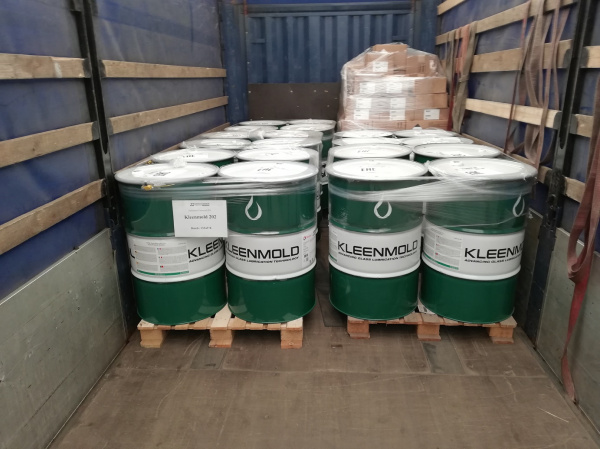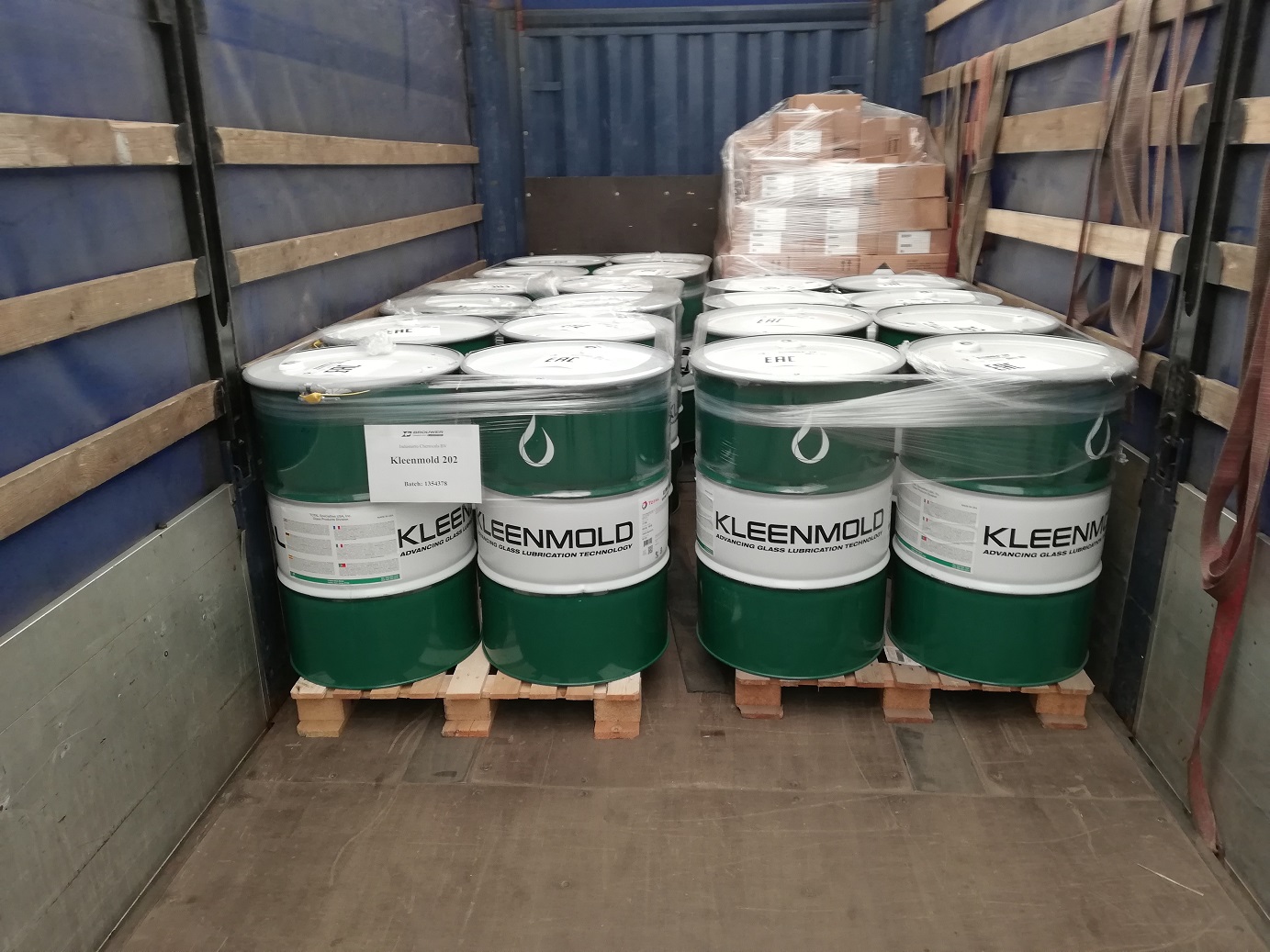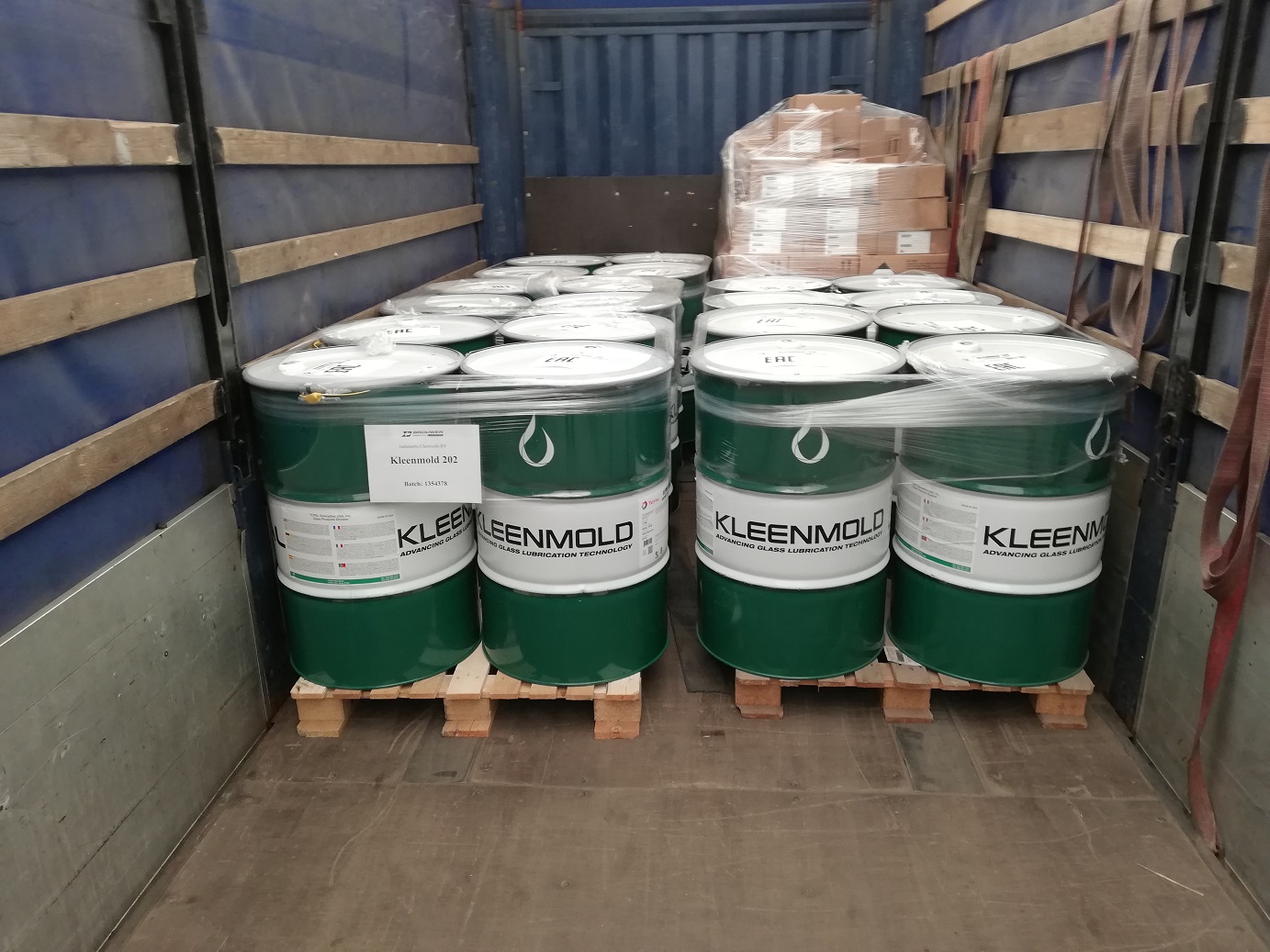Glass Lube 3
| Appearance | Black, viscous liquid |
| Odor | Chemical Odor |
| pH | 1.0 to 2.0 |
| Density [25°C] [77°F] | 10.4 |
| Flash Point | None |
| Net weight | 560 grams [0.6 kg] |
| Storage life | At least 12 months in a sealed container at room temperature |
- Description
- Advantages
- Recommendations for use
Glass Lube 3 is a semi-permanent coating to be used as a preplate for blanks, molds, rings and related equipment in the glass container industry.
Glass Lube 3 is a water-based product composed ofgraphite and high temperature binders.
Glass Lube 3 has excellent adhesion to the mold surface providing a highly polished, durable coating.
Glass Lube 3 must be applied to heated mold equipment using a Binks [or equivalent] type spray gun.
Glass Lube 3 is a water-based product composed ofgraphite and high temperature binders.
Glass Lube 3 has excellent adhesion to the mold surface providing a highly polished, durable coating.
Glass Lube 3 must be applied to heated mold equipment using a Binks [or equivalent] type spray gun.
WATER-BASED
START-UPS / JOB CHANGES:WITHOUT SWABBING
SMOOTH UNIFORM COATING PRODUCES SHINY WARE
CAUTION: CORROSIVE LIQUID
WEAR PROTECTIVE EQUIPMENT DURING APPLICATION
START-UPS / JOB CHANGES:WITHOUT SWABBING
SMOOTH UNIFORM COATING PRODUCES SHINY WARE
CAUTION: CORROSIVE LIQUID
WEAR PROTECTIVE EQUIPMENT DURING APPLICATION
SURFACE PREPARATION
Clean and degrease the surface
Oil, rust, grease, loose particlesor other materials should be thoroughly removed from all surfaces to be coated. It is recommended that the surface be degreased and sandblasted prior to application. Avoid finger marks and further contamination of cleaned surfaces before coating.
MIXING
Thoroughly agitate to provide uniform product
The contents of the product may settle over time to the bottom of the jar.
APPLICATION PROCEDURE
Apply in ventilated spray booth
Wear protective clothing
Mold equipment must be heated to between 93° and 150°C [200° and 300°F]
Cure at 300°C (632°F) for at least 60 minutes
Spray both seams, then the center of the blank cavity
Apply a smooth, even coating
We recommend the use of a Bink’s Spray Gun Model #2001SS Spray Gun with a combination of 565N Needle, 66SS Fluid Nozzle and 66SS Air Nozzle. Air pressure should be maintained between 25 to 30 pounds maximum. Blanks should be sprayed with the neck down. This will ensure that the loading zone of the blank is well coated. The product should be sprayed from top to bottom.
BLANK MOLDS:Spray both seams of the blank mold first, then spray the center of the blank cavity. Spraying of the blank is completed when surface is fuzzy gray in color and will not reflect light. The coating will be 1-1/2 to 2 thousandths of an inch in thickness. Remove fuzzy appearance from the surface by wiping the cavity lightly with a soft cloth or swab.
NECK RINGS: Remove guide ring and open neck ring so threads are exposed. Spray light coating on threads of the neck ring. Spray tops of the neck ring with the same thickness as the blanks.
BOTTOM PLATES AND BAFFLES: Spray the same as the blanks.
FINISH MOLDS: Spray tops of molds same as blanks. Spray a light coat on the cavity of the mold and wipe off well. Coating on the molds serves as a release agent more than a lubricant.
Clean and degrease the surface
Oil, rust, grease, loose particlesor other materials should be thoroughly removed from all surfaces to be coated. It is recommended that the surface be degreased and sandblasted prior to application. Avoid finger marks and further contamination of cleaned surfaces before coating.
MIXING
Thoroughly agitate to provide uniform product
The contents of the product may settle over time to the bottom of the jar.
APPLICATION PROCEDURE
Apply in ventilated spray booth
Wear protective clothing
Mold equipment must be heated to between 93° and 150°C [200° and 300°F]
Cure at 300°C (632°F) for at least 60 minutes
Spray both seams, then the center of the blank cavity
Apply a smooth, even coating
We recommend the use of a Bink’s Spray Gun Model #2001SS Spray Gun with a combination of 565N Needle, 66SS Fluid Nozzle and 66SS Air Nozzle. Air pressure should be maintained between 25 to 30 pounds maximum. Blanks should be sprayed with the neck down. This will ensure that the loading zone of the blank is well coated. The product should be sprayed from top to bottom.
BLANK MOLDS:Spray both seams of the blank mold first, then spray the center of the blank cavity. Spraying of the blank is completed when surface is fuzzy gray in color and will not reflect light. The coating will be 1-1/2 to 2 thousandths of an inch in thickness. Remove fuzzy appearance from the surface by wiping the cavity lightly with a soft cloth or swab.
NECK RINGS: Remove guide ring and open neck ring so threads are exposed. Spray light coating on threads of the neck ring. Spray tops of the neck ring with the same thickness as the blanks.
BOTTOM PLATES AND BAFFLES: Spray the same as the blanks.
FINISH MOLDS: Spray tops of molds same as blanks. Spray a light coat on the cavity of the mold and wipe off well. Coating on the molds serves as a release agent more than a lubricant.
C A U T I O N !
CORROSIVE LIQUID, N.O.S.; PHOSPHORIC ACID; UN 1760
DANGER: Avoid contact with eyes and skin. Eye or skin contact willcause burns. Wear protective goggles, gloves and clothing. Avoid breathing vapors and mist. Use with adequate ventilation.



